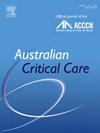Effectiveness of mindfulness-based interventions on psychosocial well-being and occupational-related outcomes among nurses in the intensive care unit: A systematic review and meta-analysis
IF 2.7
3区 医学
Q2 CRITICAL CARE MEDICINE
引用次数: 0
Abstract
Background
Mindfulness-based interventions may contribute to the mental health status and well-being of nurses. Current results are inconsistent, and there are no systematic review and meta-analyses for intensive care unit (ICU) nurses.
Aim
The aim of this study was to assess the effectiveness of mindfulness-based interventions on psychosocial well-being and occupational-related outcomes among nurses in the ICU.
Methods
We conducted a comprehensive literature search across 12 electronic databases, including PubMed, Web of Science, Embase, CINAHL, PsycINFO, Cochrane Library, CNKI, Wanfang, VIP, SinoMed, ClinicalTrials.gov, and preprint repositories (bioRxiv and medRxiv). Additionally, we screened the reference lists of included studies to identify other potentially relevant research. The search covered records from the inception of each database up to July 2024. Two researchers independently screened studies and extracted data. ReviewManager (version 5.3 was used to conduct the meta-analysis.
Results
A total of 29 studies were included in the meta-analysis to evaluate the effects of mindfulness-based interventions across different timeframes: immediate-term effects (within 10 days post intervention), short-term effects (10 days–3 months), medium-term effects (3–6 months), and long-term effects (beyond 6 months). The results showed that mindfulness-based interventions significantly alleviated anxiety (mean difference [MD]: −10.80, 95% confidence interval [CI]: [-16.76, −4.83], I2 = 78%, P < 0.001) and depression (MD: −12.02, 95% CI: [-12.43, −11.61], I2 = 0%, P < 0.001) in the medium term for ICU nurses. Significant immediate-term effects were observed on well-being (standardised mean difference [SMD]: 0.58, 95% CI: [0.40, 0.76], I2 = 0%, P < 0.001), resilience (MD: 14.41, 95% CI: [9.71, 19.11], I2 = 91%, P < 0.001), and death anxiety (MD: −2.35, 95% CI: [-4.39, −0.31], I2 = 30%, P = 0.02). Mindfulness-based interventions also showed significant short-term effects on well-being (SMD: 0.54, 95% CI: [0.10, 0.99], I2 = 43%, P = 0.02), sleep quality (MD: −1.19, 95% CI: [-2.32, −0.05], I2 = 50%, P = 0.04), and stress (SMD: −0.75, 95% CI: [-1.34, −0.17], I2 = 79%, P = 0.01). Significant effects were observed across immediate-term, short-term, and medium-term timeframes for stress reduction (medium-term effects: MD: −9.69, 95% CI: [-10.18, −9.21], I2 = 0%, P < 0.001) and mindfulness improvement (medium-term effects: MD: 9.28, 95% CI: [7.20, 11.37], I2 = 0%, P < 0.001). Additionally, mindfulness-based interventions significantly reduced burnout in the immediate term (SMD: −1.28, 95% CI: [-2.31, −0.25], I2 = 92%, P = 0.01).
Conclusions
Mindfulness-based interventions have a positive effect in improving psychosocial well-being and occupational-related outcomes for ICU nurses. Nursing managers may consider integrating mindfulness-based interventions into ICU nurses’ practice to enhance their well-being.
Registration
The study protocol was registered with the International Prospective Register of Systematic Reviews (PROSPERO) under the registration number CRD42024572633 (available at https://www.crd.york.ac.uk/PROSPERO/view/CRD42024572633.)
基于正念的干预对重症监护室护士心理健康和职业相关结果的有效性:一项系统回顾和荟萃分析
背景:基于正念的干预可能有助于护士的心理健康状况和福祉。目前的结果不一致,没有对重症监护病房(ICU)护士的系统回顾和荟萃分析。目的本研究的目的是评估正念干预对ICU护士心理社会健康和职业相关结果的有效性。方法对PubMed、Web of Science、Embase、CINAHL、PsycINFO、Cochrane Library、CNKI、万方、VIP、中国医学信息网、ClinicalTrials.gov、预印本库(bioRxiv和medRxiv)等12个电子数据库进行文献检索。此外,我们筛选了纳入研究的参考文献列表,以确定其他潜在的相关研究。搜索涵盖了从每个数据库建立到2024年7月的记录。两名研究人员独立筛选研究并提取数据。使用ReviewManager (version 5.3)进行meta分析。结果共有29项研究被纳入meta分析,以评估不同时间段内正念干预的效果:近期效果(干预后10天内)、短期效果(10天至3个月)、中期效果(3-6个月)和长期效果(6个月以上)。结果显示,正念干预显著缓解焦虑(平均差异[MD]: - 10.80, 95%可信区间[CI]: [-16.76, - 4.83], I2 = 78%, P <;0.001)和抑郁症(MD: - 12.02, 95% CI: [-12.43, - 11.61], I2 = 0%, P <;0.001)。在幸福感方面观察到显著的近期效应(标准化平均差[SMD]: 0.58, 95% CI: [0.40, 0.76], I2 = 0%, P <;0.001),恢复力(MD: 14.41, 95% CI: [9.71, 19.11], I2 = 91%, P <;0.001),和死亡焦虑(MD:−2.35,95%置信区间CI: -4.39−0.31,I2 = 30%, P = 0.02)。以正力为基础的干预也对幸福感(SMD: 0.54, 95% CI: [0.10, 0.99], I2 = 43%, P = 0.02)、睡眠质量(MD: - 1.19, 95% CI: [-2.32, - 0.05], I2 = 50%, P = 0.04)和压力(SMD: - 0.75, 95% CI: [-1.34, - 0.17], I2 = 79%, P = 0.01)有显著的短期影响。在短期、短期和中期时间框架内观察到显著的减压效果(中期效果:MD: - 9.69, 95% CI: [-10.18, - 9.21], I2 = 0%, P <;0.001)和正念改善(中期效应:MD: 9.28, 95% CI: [7.20, 11.37], I2 = 0%, P <;0.001)。此外,基于正念的干预在短期内显著减少了倦怠(SMD: - 1.28, 95% CI: [-2.31, - 0.25], I2 = 92%, P = 0.01)。结论正念干预对改善ICU护士的心理社会健康和职业相关结局具有积极作用。护理经理可以考虑将基于正念的干预措施整合到ICU护士的实践中,以提高他们的幸福感。该研究方案已在国际前瞻性系统评价登记处(PROSPERO)注册,注册号为CRD42024572633(可在https://www.crd.york.ac.uk/PROSPERO/view/CRD42024572633上获得)。
本文章由计算机程序翻译,如有差异,请以英文原文为准。
求助全文
约1分钟内获得全文
求助全文
来源期刊

Australian Critical Care
NURSING-NURSING
CiteScore
4.90
自引率
9.10%
发文量
148
审稿时长
>12 weeks
期刊介绍:
Australian Critical Care is the official journal of the Australian College of Critical Care Nurses (ACCCN). It is a bi-monthly peer-reviewed journal, providing clinically relevant research, reviews and articles of interest to the critical care community. Australian Critical Care publishes peer-reviewed scholarly papers that report research findings, research-based reviews, discussion papers and commentaries which are of interest to an international readership of critical care practitioners, educators, administrators and researchers. Interprofessional articles are welcomed.
 求助内容:
求助内容: 应助结果提醒方式:
应助结果提醒方式:


